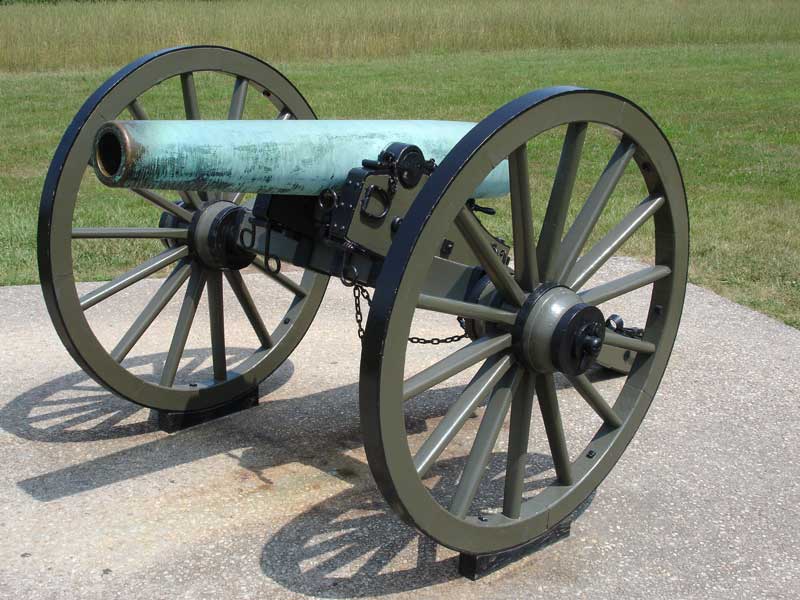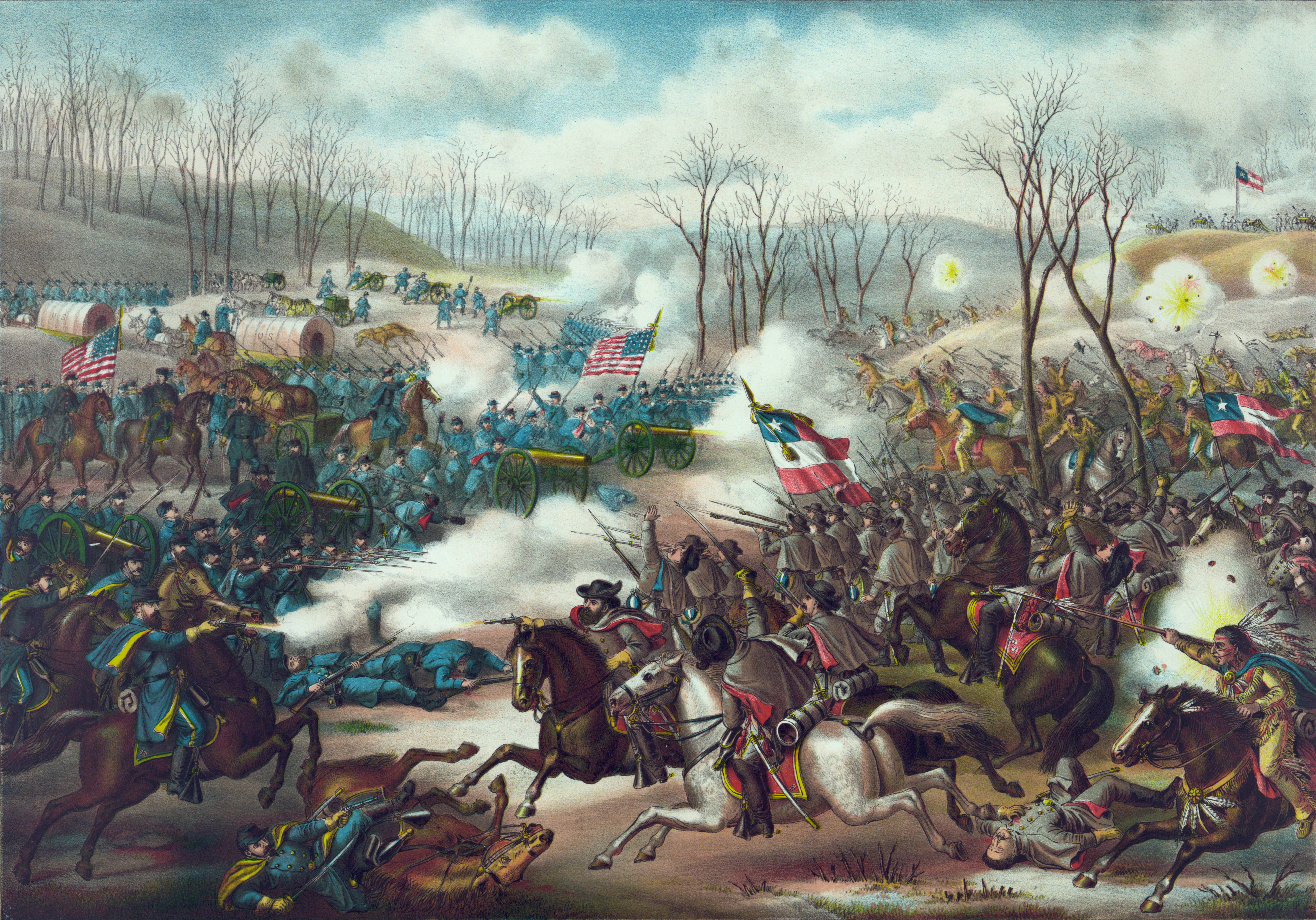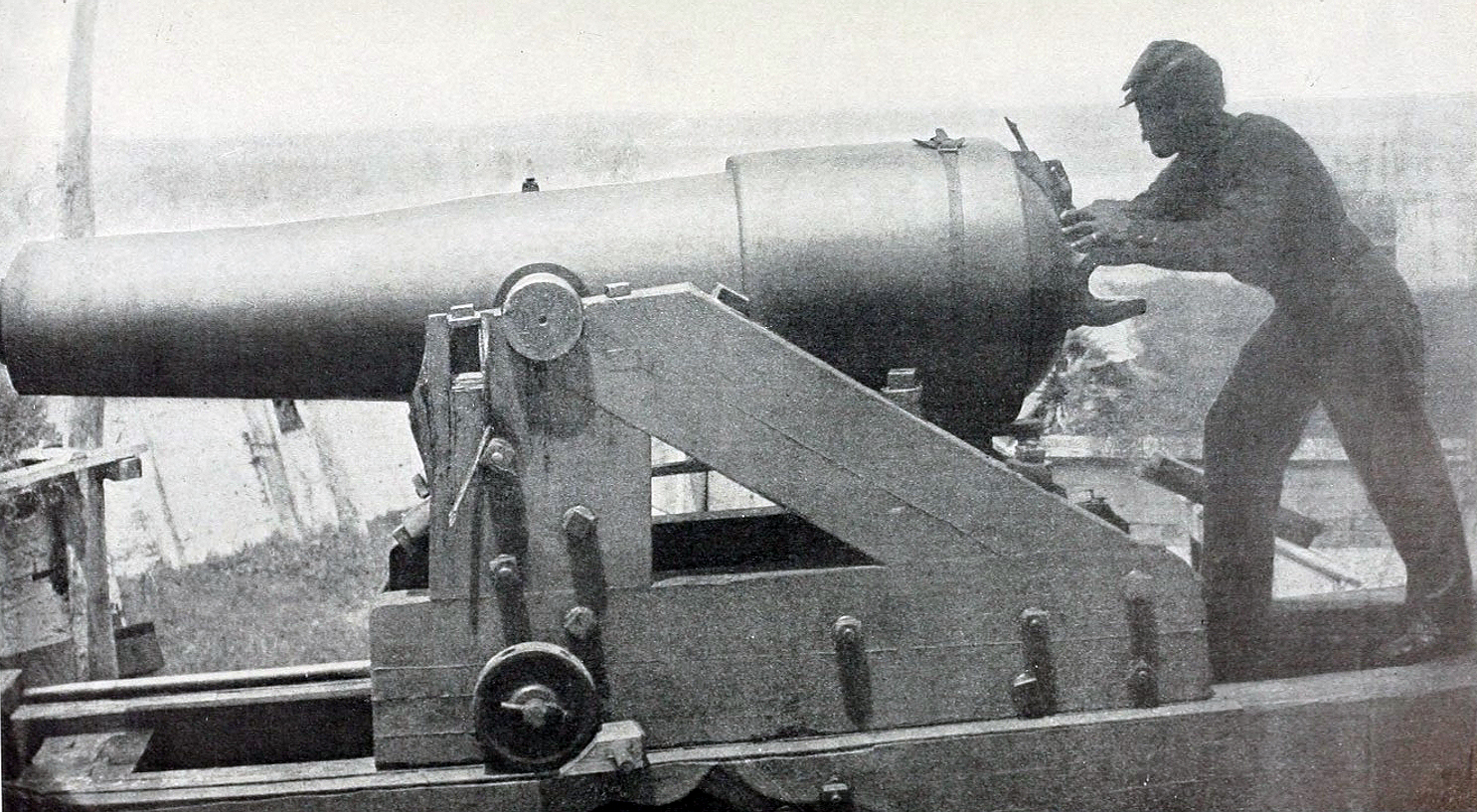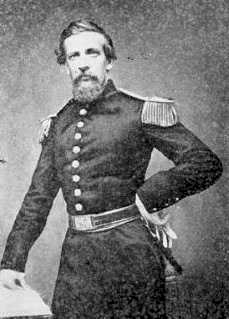|
Landis' Missouri Battery
Landis's Missouri Battery, also known as Landis's Company, Missouri Light Artillery, was an artillery battery that served in the Confederate States Army during the early stages of the American Civil War. The battery was formed when Captain John C. Landis recruited men from the Missouri State Guard in late 1861 and early 1862. The battery fielded two 12-pounder Napoleon field guns and two 24-pounder howitzers for much of its existence, and had a highest reported strength of 62 men. After initially serving in the Trans-Mississippi Theater, where it may have fought in the Battle of Pea Ridge, it was transferred east of the Mississippi River. The battery saw limited action in 1862 at the Battle of Iuka and at the Second Battle of Corinth. In 1863, the battery was transferred to Grand Gulf, Mississippi, a key point on the Mississippi River. After Major General Ulysses S. Grant landed Union infantry at Bruinsburg, Landis's Battery formed part of Confederate defenses at the battles of ... [...More Info...] [...Related Items...] OR: [Wikipedia] [Google] [Baidu] |
Vicksburg National Military Park
Vicksburg National Military Park preserves the site of the American Civil War Battle of Vicksburg, waged from March 29 to July 4, 1863. The park, located in Vicksburg, Mississippi, flanking the Mississippi River, also commemorates the greater Vicksburg Campaign which led up to the battle. Reconstructed forts and trenches evoke memories of the 47-day siege that ended in the surrender of the city. Victory here and at Port Hudson, farther south in Louisiana, gave the Union control of the Mississippi River. Battlefield The park includes 1,325 historic monuments and markers, of historic trenches and earthworks, a tour road, a walking trail, two antebellum homes, 144 emplaced cannons, the restored gunboat USS ''Cairo'' (sunk on December 12, 1862, on the Yazoo River), and the Grant's Canal site, where the Union Army attempted to build a canal to let their ships bypass Confederate artillery fire. The ''Cairo'', also known as the "Hardluck Ironclad," was the first U.S. s ... [...More Info...] [...Related Items...] OR: [Wikipedia] [Google] [Baidu] |
Grand Gulf, Mississippi
Grand Gulf is a ghost town in Claiborne County, Mississippi, United States. History Grand Gulf was named for the large whirlpool, (or gulf), formed by the Mississippi River flowing against a large rocky bluff. René-Robert Cavelier, Sieur de La Salle, La Salle and Zadok Cramer commented on the dangers caused by the eddies at Grand Gulf. The British and Spanish created settlements in the area and it continued to grow after the land became part of the United States. According to the ''Clarion-Ledger'' newspaper, "Of the three towns [in Claiborne County] mentioned as existing prior to 1829, Grand Gulf, eight miles northwest of Port Gibson, Mississippi, Port Gibson, was by far the most prosperous. With several schools, two large hotels, two weekly newspapers, this flourshing town came very near being chosen as the county seat. By reason of its location on the Mississippi River, it was a commercial point of great importance. Old records show that from Sept. 1, 1834 to May 19, 1835, a p ... [...More Info...] [...Related Items...] OR: [Wikipedia] [Google] [Baidu] |
Northern United States
The Northern United States, commonly referred to as the American North, the Northern States, or simply the North, is a geographical and historical region of the United States. History Early history Before the 19th century westward expansion, the "Northern United States" corresponded to the present day New England region. By the 1830s it corresponded to the present day Northeast and Great Lakes region. Before 1865, the North was distinguished from the South on the issue of slavery. In Southern states, slavery was legal until the ratification of the 13th Amendment in 1865. Northern states had all passed some form of legislation to abolish slavery by 1804. However, abolition did not mean freedom for some existing slaves. Due to gradual abolition laws, slaves would still appear in some Northern states as far as the 1840 United States census. New Jersey was the last Northern state to end slavery when the 13th Amendment was ratified in 1865. American Civil War During the Ameri ... [...More Info...] [...Related Items...] OR: [Wikipedia] [Google] [Baidu] |
Wade's Missouri Battery
Wade's Battery (later Walsh's Battery, also known as the 1st Light Battery) was an artillery battery in the Confederate States Army during the American Civil War. The battery was mustered into Confederate service on December 28, 1861; many of the members of the battery had previously served in the Missouri State Guard. Assigned to the First Missouri Brigade, the battery saw action at the Battle of Pea Ridge and the Second Battle of Corinth in 1862. In 1863, the battery fought at the Battle of Grand Gulf, where Captain (United States), Captain William Wade, first commander of the battery, was killed. The battery later saw action at the Battle of Champion Hill, Battle of Big Black River Bridge, and the Siege of Vicksburg. When the Confederates surrendered at the end of the Siege of Vicksburg, the men of the battery became Prisoner of war, prisoners of war. After a prisoner exchange, the men of the battery were combined with Landis's Battery and Guibor's Battery on October 3, 1 ... [...More Info...] [...Related Items...] OR: [Wikipedia] [Google] [Baidu] |
Prisoner Exchange
A prisoner exchange or prisoner swap is a deal between opposing sides in a conflict to release prisoners: prisoner of war, prisoners of war, spy, spies, hostages, etc. Sometimes, cadaver, dead bodies are involved in an exchange. Geneva Conventions Under the Geneva Conventions, prisoners who ''cannot'' contribute to the war effort because of Wounded in action, illness or disability are entitled to be repatriated to their home country. That is regardless of number of prisoners so affected; the detaining power cannot refuse a genuine request. Under the Geneva Convention on Prisoners of War (1929), Geneva Convention (1929), this is covered by Articles 68 to 74, and the annex. One of the largest exchange programmes was run by the International Committee of the Red Cross, International Red Cross during World War II under these terms. Under the Third Geneva Convention of 1949, that is covered by Articles 109 to 117. The World War II in Yugoslavia, Second World War in Yugoslavia saw ... [...More Info...] [...Related Items...] OR: [Wikipedia] [Google] [Baidu] |
Vicksburg, Mississippi
Vicksburg is a historic city in Warren County, Mississippi, United States. It is the county seat. The population was 21,573 at the 2020 census. Located on a high bluff on the east bank of the Mississippi River across from Louisiana, Vicksburg was built by French colonists in 1719. The outpost withstood an attack from the native Natchez people. It was incorporated as Vicksburg in 1825 after Methodist missionary Newitt Vick. The area that is now Vicksburg was long occupied by the Natchez as part of their historical territory along the Mississippi. The first Europeans who settled the area were French colonists who built Fort Saint Pierre in 1719 on the high bluffs overlooking the Yazoo River at present-day Redwood. They conducted fur trading with the Natchez and others, and started plantations. During the American Civil War, it was a key Confederate river-port, and its July 1863 surrender to Ulysses S. Grant, along with the concurrent Battle of Gettysburg, marked the turning-p ... [...More Info...] [...Related Items...] OR: [Wikipedia] [Google] [Baidu] |
Siege Of Vicksburg
The siege of Vicksburg (May 18 – July 4, 1863) was the final major military action in the Vicksburg campaign of the American Civil War. In a series of maneuvers, Union Major General Ulysses S. Grant and his Army of the Tennessee crossed the Mississippi River and drove the Confederate Army of Mississippi, led by Lieutenant General John C. Pemberton, into the defensive lines surrounding the fortress city of Vicksburg, Mississippi, leading to the successful siege and Confederate surrender. Vicksburg was the last major Confederate stronghold on the Mississippi River; therefore, capturing it completed the second part of the Northern strategy, the Anaconda Plan. When two major assaults against the Confederate fortifications, on May 19 and 22, were repulsed with heavy casualties, Grant decided to besiege the city beginning on May 25. After holding out for more than 40 days, with their supplies nearly gone, the garrison surrendered on July 4. The Vicksburg campaign's successfu ... [...More Info...] [...Related Items...] OR: [Wikipedia] [Google] [Baidu] |
Battle Of Big Black River Bridge
The Battle of Big Black River Bridge was fought on May 17, 1863, as part of the Vicksburg Campaign of the American Civil War. During the war, the city of Vicksburg, Mississippi, was a key point on the Mississippi River. On April 30, 1863, a Union (American Civil War), Union army commanded by Major General (United States), Major General Ulysses S. Grant began crossing onto the east side of the Mississippi River as part of a campaign against Vicksburg. After engaging and defeating Confederate States of America, Confederate forces in several intermediate battles, Grant's army defeated Lieutenant General (CSA), Lieutenant General John C. Pemberton's troops at the decisive Battle of Champion Hill on May 16. During the retreat from Champion Hill battlefield, one division (military), division of Pemberton's army, commanded by Major General William Wing Loring, William W. Loring, was cut off from Pemberton's main body. Pemberton, retreating westwards towards Vicksburg, did not know the ... [...More Info...] [...Related Items...] OR: [Wikipedia] [Google] [Baidu] |
Battle Of Champion Hill
The Battle of Champion Hill (aka Champion's Hill) of May 16, 1863, was the pivotal battle in the Vicksburg Campaign of the American Civil War (1861–1865). Union Army commander Major General Ulysses S. Grant and the Army of the Tennessee pursued the retreating Confederate States Army under Lieutenant General John C. Pemberton and defeated it twenty miles to the east of Vicksburg, Mississippi, leading inevitably to the Siege of Vicksburg and surrender. The battle is also known as Baker's Creek. Sidney S. Champion, born in Guilford County, North Carolina, in 1824, came to Mississippi and settled on a large tract of land located between Bolton and Edwards. Captain Champion was a seasoned Confederate soldier long before the outbreak of the Battle of Champion Hill. The night of May 15 found Captain Champion within range of the battle site and serving as a vital member of General Pemberton's staff. Background Following the Union occupation of Jackson, Mississippi, on M ... [...More Info...] [...Related Items...] OR: [Wikipedia] [Google] [Baidu] |
Lieutenant
A lieutenant ( , ; abbreviated Lt., Lt, LT, Lieut and similar) is a Junior officer, junior commissioned officer rank in the armed forces of many nations, as well as fire services, emergency medical services, Security agency, security services and police forces. The rank in armies and air forces is often subdivided into subcategories of seniority. In Comparative navy officer ranks of Anglophone countries, English-speaking navies, lieutenants are often equivalent to the army rank of Captain (armed forces), captain; in other navies, the lieutenants are usually equal to their army counterparts. ''Lieutenant'' may also appear as part of a title used in various other organisations with a codified command structure. It often designates someone who is "second-in-command", and as such, may precede the name of the rank directly above it. For example, a "lieutenant master" is likely to be second-in-command to the "master" in an organisation using both ranks. Political uses include lieu ... [...More Info...] [...Related Items...] OR: [Wikipedia] [Google] [Baidu] |
Battle Of Port Gibson
The Battle of Port Gibson (May 1, 1863) was fought between a Union Army commanded by Major General Ulysses S. Grant and a reinforced Confederate States Army division led by Major General John S. Bowen. Though the outnumbered Confederate soldiers fought stubbornly, they were steadily pressed back during the day by Major General John A. McClernand's troops. Bowen eventually conceded the field by withdrawing north toward Vicksburg, Mississippi. The battle occurred near Port Gibson, Mississippi, during the Vicksburg Campaign of the American Civil War. Starting in November 1862, Grant tried various strategies in order to attack Vicksburg, and in each case, his army was unsuccessful. Finally, Grant ordered his army to march through swampy terrain on the west bank of the Mississippi River in an attempt to get south of Vicksburg. The Union commander gambled that the Union Navy under Acting Rear Admiral David Dixon Porter could safely pass the Vicksburg batteries. The operation was success ... [...More Info...] [...Related Items...] OR: [Wikipedia] [Google] [Baidu] |




